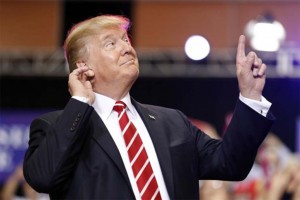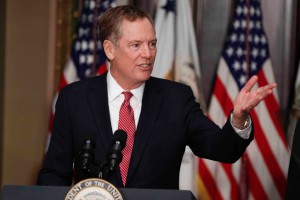With chances the of failure rising, delegates from the United States, Mexico and Canada have wrapped up another round of talks centered on revising the North American Free Trade Agreement without making any progress on a range of key issues such as automobiles and agriculture.
The negotiations held in Mexico City were aimed at reforming the NAFTA pact enough to head off U.S. President Donald Trump’s threats to scrap it.
The latest round focused on trade remedies, rules of origin, which are critical to the auto industry, and matters related to agriculture, which represents a key element of any kind of agreement, Mexico’s chief technical negotiator, Kenneth Smith, told reporters.
Both automakers and agribusinesses fret that canceling NAFTA would have serious adverse economic repercussions in their respective industries.
(Difficult NAFTA talks resuming after “impasse.” For the story, Click Here.)
More complicated subjects “are going to be left for the following meetings,” he said.
Various U.S. proposals were put on the table, as were some Mexican ones, while specific questions were raised in other areas, Smith explained.
After the three countries issued a short joint statement underlining modest advances and vowing to continue work on concluding negotiations “as soon as possible,” U.S. Trade Representative Robert Lighthizer struck a somewhat different tone.
“While we have made progress on some of our efforts to modernize NAFTA, I remain concerned about the lack of headway,” he said in a statement. “Thus far, we have seen no evidence that Canada or Mexico are willing to seriously engage on provisions that will lead to a rebalanced agreement. Absent rebalancing, we will not reach a satisfactory result,” Lighthizer added.
Meanwhile, “some concepts that are unacceptable” were put forward regarding rules of origin in the automobile industry, he said.
Much friction centered on Mexican and Canadian rejection of a U.S. proposal to raise the minimum threshold for autos to 85% North American content from 62.5% as well as to require half of vehicle content to be from the United States.
(Click Here for details about Trump’s warning against NAFTA talks.)
Trump, who espouses an “America first” policy, views the U.S. trade deficit with Mexico in particular as a “disaster” for American jobs and prosperity.
“I’ve been opposed to NAFTA for a long time,” Trump said last month, as he hosted Canadian Prime Minister Justin Trudeau at the White House.
“If we can’t make a deal, it’ll be terminated and that will be fine,” Trump said this past summer.
Supporters of NAFTA, including the U.S. Chamber of Commerce and other business groups, have said with increasing intensity that NAFTA has greatly benefited the U.S. economy during its 23 years of existence. Trade has tripled in that time, and withdrawal could easily wind up hurting American farmers and Mexico.
For Mexico, preserving the pact is vital, as 80% of its exports go to the United States and it has not been able to develop markets for goods in East Asia, which is emerging as the world’s largest market.
Negotiations on changing the accord are expected to go on into early next year when the political calendar become more difficult because of the Presidential election in Mexico as well as elections in Canada and the United States.
(NAFTA talks bog down as sides take a recess. To get more detail, Click Here.)
The three nations have vowed to continue talks on the North American Free Trade Agreement through March, but the yawning disagreements on core U.S. demands are piling pressure on negotiators to come up with fixes before Mexico’s 2018 presidential campaign begins in the spring.



When is the donald bringing his production business back to the US?
Or Ivanka’s?